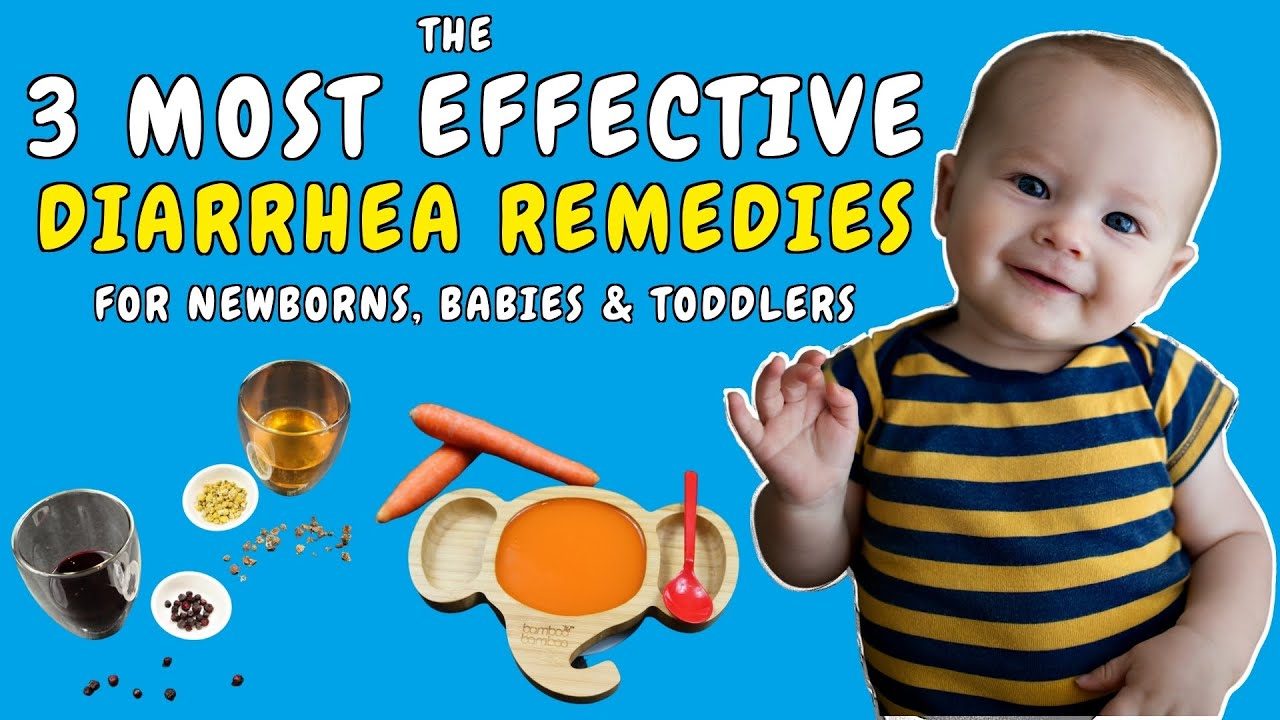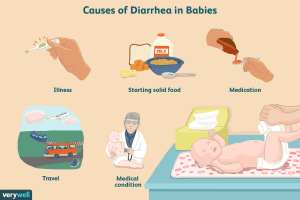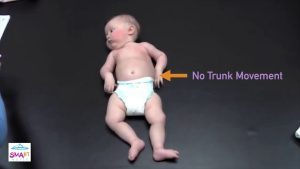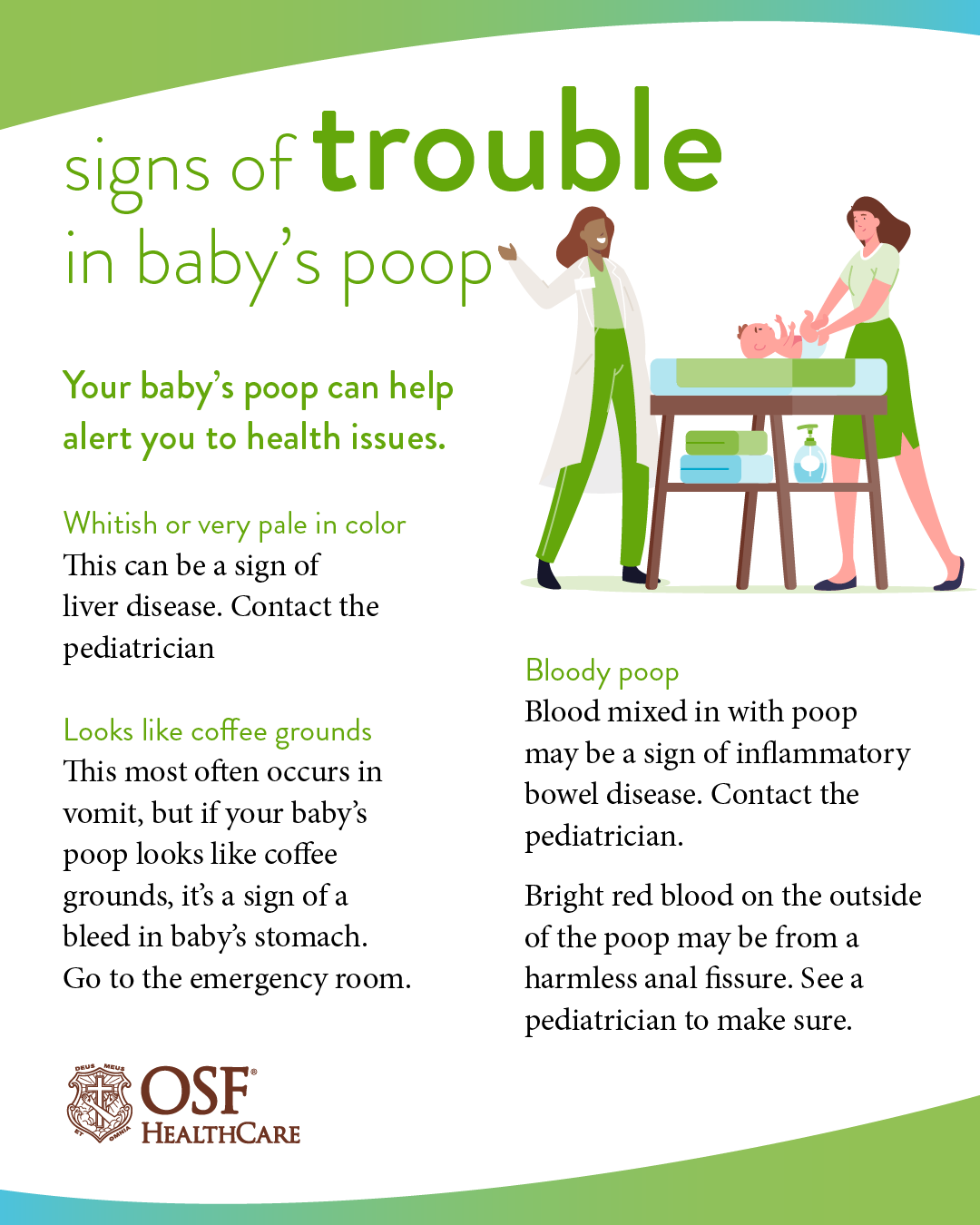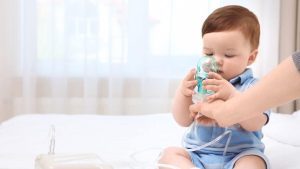How to stop diarrhea in babies fast, give small sips of oral rehydration solution frequently. Avoid dairy products.
Diarrhea in babies can be distressing for both the child and the parents. It can lead to dehydration and discomfort, making it crucial to address the issue promptly. While occasional bouts of diarrhea are common in babies, persistent symptoms require immediate attention.
By following some simple yet effective steps, you can help alleviate your baby’s diarrhea and prevent complications. We will explore practical tips and remedies to stop diarrhea in babies fast, ensuring your little one gets back to their healthy, happy self in no time.

Causes Of Diarrhea In Babies
Causes of Diarrhea in Babies:
Viral Infections
Viral infections are a common cause of diarrhea in babies, often leading to symptoms such as loose stools and stomach discomfort.
Bacterial Infections
Bacterial infections can also trigger diarrhea in babies, causing gastrointestinal upset and frequent bowel movements.
Food Allergies
Food allergies can contribute to diarrhea in babies, as certain foods may not be well-tolerated by their developing digestive systems.
:max_bytes(150000):strip_icc()/diarrhea-in-the-breastfed-baby-431632-v1-5c01932a46e0fb0001cbf7ac.png)
Identifying Diarrhea In Babies
Babies are delicate beings, and as parents, it’s crucial to be able to identify the signs of diarrhea in your little one. Diarrhea in babies can lead to dehydration and discomfort, so early recognition is key.
Frequency Of Bowel Movements
- Normal: Babies typically have several bowel movements a day.
- Diarrhea: If your baby is having more frequent bowel movements than usual, it could be a sign of diarrhea.
Consistency Of Stool
- Normal: Baby stool is soft, formed, and easy to clean.
- Diarrhea: Watery, loose, or mucus-filled stools indicate diarrhea in babies.
When To Seek Medical Help
While most cases of diarrhea in babies can be managed at home, it’s crucial to know when to seek medical help. If your baby shows any signs of dehydration or if the diarrhea is persistent, it’s important to consult a healthcare professional immediately.
Signs Of Dehydration
Dehydration can occur quickly in babies with diarrhea. Look for signs such as excessive thirst, dry mouth, fewer wet diapers, dark urine, sunken eyes, and lethargy. If you notice any of these symptoms, seek medical attention without delay.
Persistent Diarrhea
If your baby’s diarrhea is persistent, lasting for more than a few days, or if it is accompanied by high fever, blood in the stool, or severe abdominal pain, it’s essential to consult a healthcare professional promptly. Persistent diarrhea can lead to dehydration and other complications, so swift medical intervention is crucial.
Effective Home Remedies
Babies experiencing diarrhea need quick relief. Here are some simple home remedies that can help alleviate symptoms:
Oral Rehydration Solution
- Oral rehydration solution (ORS) is crucial to prevent dehydration
- Mix 1 teaspoon of salt and 8 teaspoons of sugar in 1 liter of clean water
- Offer small sips of ORS to the baby frequently to keep them hydrated
Probiotics And Yogurt
- Probiotics can restore the balance of good bacteria in the gut
- Yogurt with live cultures is a good source of probiotics for babies
- Give small amounts of plain yogurt to your baby to aid in digestion
Brat Diet
- BRAT diet consists of bananas, rice, applesauce, and toast
- These foods are gentle on the stomach and can help firm up stools
- Introduce these foods gradually to your baby to ease digestive discomfort
Feeding Tips For Babies With Diarrhea
Discover effective feeding tips for babies with diarrhea to help stop symptoms fast. Focus on gentle, easily digestible foods and fluids to soothe the stomach and prevent dehydration. Consult a pediatrician for personalized advice and guidance tailored to your baby’s needs.
When babies have diarrhea, it can be difficult to know what to feed them. However, it’s important to continue feeding your baby to prevent dehydration. Here are some feeding tips for babies with diarrhea:
Breastfeeding Vs. Formula Feeding
If you are breastfeeding your baby, continue to do so. Breast milk is easier for babies to digest and can help to reduce the severity and duration of diarrhea. If you are formula feeding your baby, consider switching to a lactose-free formula or a hydrolyzed protein formula. These formulas are easier to digest and may help to reduce diarrhea.
Avoiding Certain Foods
Certain foods can make diarrhea worse in babies. Avoid giving your baby spicy or greasy foods, dairy products, and high-fiber foods. Stick to bland foods such as rice cereal, bananas, and applesauce. You can also try giving your baby a solution of oral rehydration salts (ORS) to help replace lost fluids and electrolytes.
Summary
In summary, when your baby has diarrhea, it’s important to continue feeding them to prevent dehydration. Breast milk is the best option for breastfed babies, while lactose-free or hydrolyzed protein formula may be a better option for formula-fed babies. Avoid giving your baby certain foods that can make diarrhea worse and stick to bland foods instead. Additionally, you can give your baby an ORS solution to help replace lost fluids and electrolytes.
Preventing Diarrhea In Babies, Proper Handwashing
Teach kids to wash hands with soap for 20 seconds before eating.
- Scrub fingers and nails well to remove germs.
- Use warm water and dry hands with a clean towel.
Vaccinations
Ensure babies receive all recommended vaccinations on schedule.
- Consult with your pediatrician to stay updated on vaccines.
- Protect your baby from preventable diseases.
Safe Food Preparation
Handle food safely to prevent foodborne illnesses in babies.
- Wash fruits and vegetables thoroughly before consumption.
- Cook meat and eggs properly to kill harmful bacteria.
Medication For Diarrhea In Babies
Diarrhea in babies can be concerning for parents, but there are medications available to stop it fast. Consult with a pediatrician to determine the best course of treatment and ensure proper dosage for your baby.
Use Of Medications
Babies with diarrhea may require medications to alleviate symptoms. Antidiarrheal medications can help normalize bowel movements.
Consulting A Pediatrician
Always consult a pediatrician before giving any medications to a baby with diarrhea. Professional guidance is crucial for proper treatment.
Conclusion And Recap
Summary of Key Points:
- Ensure proper hydration of the baby is a priority.
- Consult a healthcare provider if diarrhea persists.
- Use age-appropriate rehydration solutions.
Importance Of Prompt Action
When diarrhea strikes babies, prompt action is crucial to prevent dehydration.
Rehydration and monitoring are key steps in managing baby diarrhea.

What Can I Give My Baby To Stop Diarrhea?
Offer your baby electrolyte solutions or breastmilk to help stop diarrhea. Consult a pediatrician for guidance.
What Settles Baby Diarrhea?
To settle baby diarrhea, ensure they stay hydrated with breast milk or formula. Offer small amounts of electrolyte solutions. Avoid dairy, fatty foods, and sugary drinks. Consult a pediatrician if symptoms persist.
How Long Should Diarrhea Last For A Baby?
Diarrhea in babies typically lasts 5-7 days. If it persists longer or is severe, consult a pediatrician.
Can I Give Water To Baby With Diarrhea?
Yes, you can give water to a baby with diarrhea to prevent dehydration. Offer small amounts frequently.
Conclusion
Knowing how to stop diarrhea in babies fast is crucial. By following simple remedies and seeking medical advice when needed, you can alleviate your baby’s discomfort quickly. Remember, hydration is key, and a balanced diet plays a vital role in preventing diarrhea.
Prioritize your baby’s health always.

